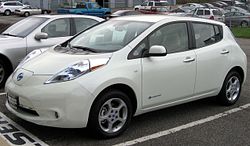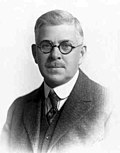Portal:Cars
The Cars PortalA car, or an automobile, is a motor vehicle with wheels. Most definitions of cars state that they run primarily on roads, seat one to eight people, have four wheels, and mainly transport people rather than cargo. There are around one billion cars in use worldwide. The French inventor Nicolas-Joseph Cugnot built the first steam-powered road vehicle in 1769, while the Swiss inventor François Isaac de Rivaz designed and constructed the first internal combustion-powered automobile in 1808. The modern car—a practical, marketable automobile for everyday use—was invented in 1886, when the German inventor Carl Benz patented his Benz Patent-Motorwagen. Commercial cars became widely available during the 20th century. The 1901 Oldsmobile Curved Dash and the 1908 Ford Model T, both American cars, are widely considered the first mass-produced and mass-affordable cars, respectively. Cars were rapidly adopted in the US, where they replaced horse-drawn carriages. In Europe and other parts of the world, demand for automobiles did not increase until after World War II. In the 21st century, car usage is still increasing rapidly, especially in China, India, and other newly industrialised countries. Cars have controls for driving, parking, passenger comfort, and a variety of lamps. Over the decades, additional features and controls have been added to vehicles, making them progressively more complex. These include rear-reversing cameras, air conditioning, navigation systems, and in-car entertainment. Most cars in use in the early 2020s are propelled by an internal combustion engine, fueled by the combustion of fossil fuels. Electric cars, which were invented early in the history of the car, became commercially available in the 2000s and widespread in the 2020s. The transition from fossil fuel-powered cars to electric cars features prominently in most climate change mitigation scenarios, such as Project Drawdown's 100 actionable solutions for climate change. (Full article...) Entries here consist of Good and Featured articles, which meet a core set of high editorial standards.
 Electric vehicle warning sounds are sounds designed to alert pedestrians to the presence of electric drive vehicles such as hybrid electric vehicles (HEVs), plug-in hybrid electric vehicles (PHEVs), and battery electric vehicles (BEVs) travelling at low speeds. Warning sound devices were deemed necessary by some government regulators because vehicles operating in all-electric mode produce less noise than traditional combustion engine vehicles and can make it more difficult for pedestrians and cyclists (especially those with visual impairments) to be aware of their presence. Warning sounds may be driver triggered (as in a horn but less urgent) or automatic at low speeds; in type, they vary from clearly artificial (beeps, chimes) to those that mimic engine sounds and those of tires moving over gravel. Japan issued guidelines for such warning devices in January 2010 and the U.S. approved legislation in December 2010. The U.S. National Highway Traffic Safety Administration issued its final ruling in February 2018, and requires the device to emit warning sounds when travelling at speeds less than 18.6 mph (30 km/h) with compliance by September 2020, but 50% of "quiet" vehicles must have the warning sounds by September 2019. In April 2014, the European Parliament approved legislation that requires the mandatory use of an Acoustic Vehicle Alerting System (AVAS). Manufacturers must install an AVAS system in four-wheeled electric and hybrid electric vehicles that are approved from July 1, 2019, and to all new quiet electric and hybrid vehicles registered from July 2021. The vehicle must make a continuous noise level of at least 56 dBA (within 2 meters) if the car is going 20 km/h (12 mph) or slower, and a maximum of 75 dBA. (Full article...) Selected article -The ACEA agreement refers to a voluntary agreement between the European Automobile Manufacturers Association (ACEA) and the European Commission to limit the amount of carbon dioxide (CO2) emitted by passenger cars sold in Europe. Signed in 1998, the agreement sought to achieve an average of 140 g/km of CO2 by 2008 for new passenger vehicles sold by the association's cars in Europe. This target represents a 25% reduction from the 1995 level of 186 g/km and is equivalent to a fuel economy of 5.8 L/100 km or 5.25 L/100 km for petrol and diesel engines respectively. However, the average for the whole car market for 2008 was 153.7 g/km, so the target has not been achieved. (Full article...) Selected picture of the day
Selected biography - Jeffrey Brian Straubel (/ˈstraʊbəl/; born December 20, 1975) is an American businessman and electrical engineer. He spent 15 years at Tesla, as chief technical officer until moving to an advisory role in July 2019. In 2023, he was elected to the company's board of directors. In 2017, Straubel founded and became the CEO of Redwood Materials, Inc., working on creating battery materials and products for lithium-ion batteries out of recycled batteries. (Full article...) On this day July 1
Did you know...
Selected quote of the dayWhen you drive from Melbourne to Broken Hill, as I did recently, you find you want to do it in a bigger, more comfortable car. If consumers bought what they wanted to buy there would always be (plenty) who would buy a full-size car. TopicsGeneral imagesThe following are images from various car-related articles on Wikipedia.
CategoriesThings you can do to help If you wish to help, you can:
Associated WikimediaThe following Wikimedia Foundation sister projects provide more on this subject:
Discover Wikipedia using portals |









































































